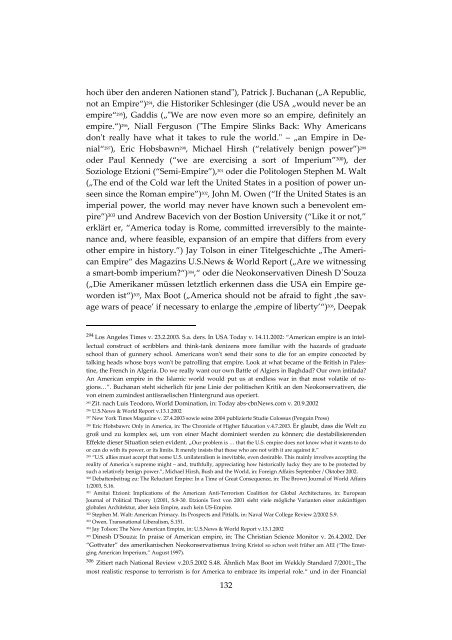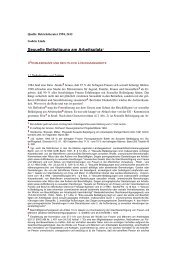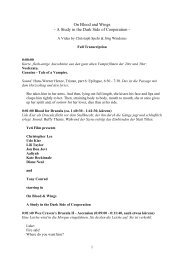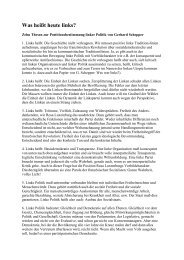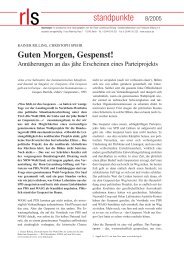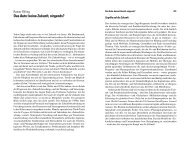outbreak. let's take over. american empire als wille ... - Rainer Rilling
outbreak. let's take over. american empire als wille ... - Rainer Rilling
outbreak. let's take over. american empire als wille ... - Rainer Rilling
Erfolgreiche ePaper selbst erstellen
Machen Sie aus Ihren PDF Publikationen ein blätterbares Flipbook mit unserer einzigartigen Google optimierten e-Paper Software.
hoch über den anderen Nationen standʺ), Patrick J. Buchanan („A Republic,<br />
not an Empire“) 294 , die Historiker Schlesinger (die USA „would never be an<br />
<strong>empire</strong>“ 295 ), Gaddis („ʺWe are now even more so an <strong>empire</strong>, definitely an<br />
<strong>empire</strong>.“) 296 , Niall Ferguson (ʺThe Empire Slinks Back: Why Americans<br />
donʹt really have what it <strong>take</strong>s to rule the world.ʺ – „an Empire in Denial“<br />
297 ), Eric Hobsbawn 298 , Michael Hirsh (“relatively benign power”) 299<br />
oder Paul Kennedy (“we are exercising a sort of Imperium” 300 ), der<br />
Soziologe Etzioni (“Semi-Empire”), 301 oder die Politologen Stephen M. Walt<br />
(„The end of the Cold war left the United States in a position of power unseen<br />
since the Roman <strong>empire</strong>”) 302 , John M. Owen (“If the United States is an<br />
imperial power, the world may never have known such a benevolent <strong>empire</strong>”)<br />
303 und Andrew Bacevich von der Bostion University (“Like it or not,”<br />
erklärt er, “America today is Rome, committed irreversibly to the maintenance<br />
and, where feasible, expansion of an <strong>empire</strong> that differs from every<br />
other <strong>empire</strong> in history.”) Jay Tolson in einer Titelgeschichte „The American<br />
Empire“ des Magazins U.S.News & World Report („Are we witnessing<br />
a smart-bomb imperium?“) 304 ,“ oder die Neokonservativen Dinesh D`Souza<br />
(„Die Amerikaner müssen letztlich erkennen dass die USA ein Empire geworden<br />
ist“) 305 , Max Boot („America should not be afraid to fight ‚the savage<br />
wars of peace’ if necessary to enlarge the ‚<strong>empire</strong> of liberty’“) 306 , Deepak<br />
294 Los Angeles Times v. 23.2.2003. S.a. ders. In USA Today v. 14.11.2002: “American <strong>empire</strong> is an intellectual<br />
construct of scribblers and think-tank denizens more familiar with the hazards of graduate<br />
school than of gunnery school. Americans wonʹt send their sons to die for an <strong>empire</strong> concocted by<br />
talking heads whose boys wonʹt be patrolling that <strong>empire</strong>. Look at what became of the British in Palestine,<br />
the French in Algeria. Do we really want our own Battle of Algiers in Baghdad? Our own intifada?<br />
An American <strong>empire</strong> in the Islamic world would put us at endless war in that most volatile of regions…”.<br />
Buchanan steht sicherlich für jene Linie der politischen Kritik an den Neokonservativen, die<br />
von einem zumindest antiisraelischen Hintergrund aus operiert.<br />
295<br />
Zit. nach Luis Teodoro, World Domination, in: Today abs-cbnNews.com v. 20.9.2002<br />
296<br />
U.S.News & World Report v.13.1.2002<br />
297<br />
New York Times Magazine v. 27.4.2003 sowie seine 2004 publizierte Studie Colossus (Penguin Press)<br />
298<br />
Eric Hobsbawn: Only in America, in: The Chronicle of Higher Education v.4.7.2003. Er glaubt, dass die Welt zu<br />
groß und zu komplex sei, um von einer Macht dominiert werden zu können; die destabilisierenden<br />
Effekte dieser Situation seien evident. „Our problem is … that the U.S. <strong>empire</strong> does not know what it wants to do<br />
or can do with its power, or its limits. It merely insists that those who are not with it are against it.”<br />
299<br />
“U.S. allies must accept that some U.S. unilateralism is inevitable, even desirable. This mainly involves accepting the<br />
reality of America`s supreme might – and, truthfully, appreciating how historically lucky they are to be protected by<br />
such a relatively benign power.”, Michael Hirsh, Bush and the World, in: Foreign Affairs September / Oktober 2002.<br />
300<br />
Debattenbeitrag zu: The Reluctant Empire: In a Time of Great Consequence, in: The Brown Journal of World Affairs<br />
1/2003, S.16.<br />
301<br />
Amitai Etzioni: Implications of the American Anti-Terrorism Coalition for Global Architectures, in: European<br />
Journal of Political Theory 1/2001, S.9-30. Etzionis Text von 2001 sieht viele mögliche Varianten einer zukünftigen<br />
globalen Architektur, aber kein Empire, auch kein US-Empire.<br />
302<br />
Stephen M. Walt: American Primacy. Its Prospects and Pitfalls, in: Naval War College Review 2/2002 S.9.<br />
303<br />
Owen, Transnational Liberalism, S.151.<br />
304<br />
Jay Tolson: The New American Empire, in: U.S.News & World Report v.13.1.2002<br />
305<br />
Dinesh DʹSouza: In praise of American <strong>empire</strong>, in: The Christian Science Monitor v. 26.4.2002. Der<br />
“Gottvater” des amerikanischen Neokonservatismus Irving Kristol so schon weit früher am AEI (“The Emerging<br />
American Imperium,” August 1997).<br />
306 Zitiert nach National Review v.20.5.2002 S.48. Ähnlich Max Boot im Wekkly Standard 7/2001:„The<br />
most realistic response to terrorism is for America to embrace its imperial role.“ und in der Financial<br />
132


